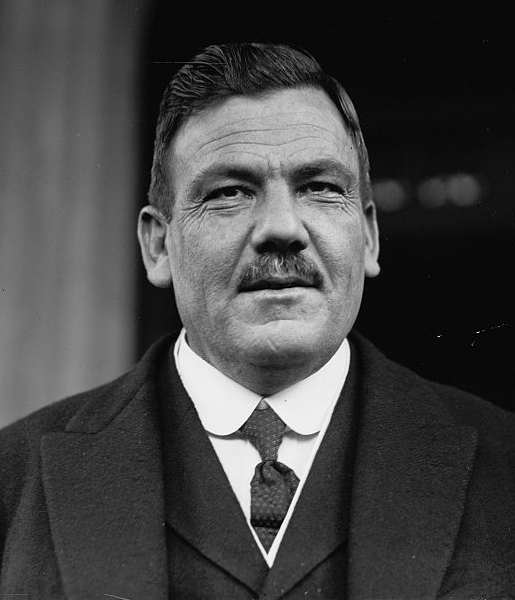 |
| Plutarco Elías Calles |
Plutarco Elías Calles was president of Mexico from 1924 to 1928, taking over from Alvaro Obregón. He was the founder of the Partido Nacional Revolucionario (National Revolutionary Party), which in 1946 would become the Institutional Revolutionary Party and dominate Mexican politics until 1988.
Plutarco Calles was born on September 25, 1877, the son of Plutarco Elías Lucero, a Lebanese man hired by the U.S. Army to test the use of camels in the southwestern United States. He was orphaned when he was three and went to live with his father's sister, Josefa Campuzano, and her husband, Juan Bautista Calles.
They looked after him well, and he took his uncle's surname as his own. Young Calles became one of the earliest teachers at the Colegio Sonora and also contributed some articles on problems in the Mexican educational system of the time. However, he left teaching, as he found the strictures too great for his independent thought.
  |
During the Mexican Revolution, Calles became a supporter of Francisco Madero and became mayor of Agua Prieta, a town on the Mexican side of the Mexican-U.S. border. When Madero was deposed and killed, Calles was involved in the resistance to the new government and rallied supporters of the revolution in Sonora.
He was involved in a battle in 1915 against Maytorena, an ally of Pancho Villa, defeating him. However, he was a politician rather than a military strategist and became the interim and later the constitutional governor of Sonora.
There he introduced some of the educational reforms that he had advocated as a teacher. He was also affected by the anticlerical traditions of the period, expelling all Roman Catholic priests from Sonora. He also introduced laws prohibiting the production and consumption of alcohol.
In 1914 President Venustiano Carranza offered Calles a cabinet position on two occasions, with Calles finally accepting the post of minister of industry, trade, and labor in 1919. By this time Calles was seen as a clear supporter of Alvaro Obregón, who was emerging as a major rival to Carranza. Both came from Sonora, and as the alliance between Carranza and Obregón began to falter Calles resigned from the cabinet and in April 1920 published his Plan de Agua Prieta calling on Sonorans to overthrow Carranza.
After the death of Carranza, Adolfo de la Huerta became president, and during his short presidency Calles became minister of war. He was then minister of the interior for three years during Obregón's period as president. It was not long before Obregón and de la Huerta were arguing, and very soon the latter was getting army support for a revolt. Calles sided with Obregón and quickly defeated the de la Huerta rebellion. When Obregón retired as president on December 1, 1924, Calles became the new president.
One of his most controversial political decisions was the Law Reforming the Penal Code. Published on July 2, 1926, this law reinforced the anticlerical provisions of the 1917 constitution by fining people who wore church decorations and even threatening five years in prison for anybody who questioned the law. Some Roman Catholics were involved in the Cristero revolt, which caused much trouble in central and western Mexico from 1926 until 1929.
Although Calles was a revolutionary, his enemies in the United States denounced him as a communist and even as a Bolshevik. On September 29, 1927, he established a direct telephone link with Calvin Coolidge.
He also managed to get the new U.S. ambassador, Dwight Morrow, who had worked for banker J. P. Morgan, to get the famous aviator Charles Lindbergh to visit Mexico City. There Lindbergh met Morrow's daughter Anne, whom he later married. Morrow was, however, critical of many of the measures that Calles had introduced.
Calles drew much of his support from the poor farmers, and his plan was to improve their lot as small businessmen. To help them, on February 1, 1926, he established the National Bank of Agricultural Credit, having overhauled the banking system and established the Bank of Mexico, modeled on the American Federal Reserve, five months earlier. He also introduced a new system of running the government finance ministry.
On November 30, 1928, Calles stood down as president, and with Obregón having been killed Emilio Portes Gil became provisional president. In 1934 Calles supported Lázaro Cárdenas, who was elected president. In the following year the press became extremely critical of Calles, who returned from retirement to defend the decisions he had made in office.
However, in 1936 Cárdenas had Calles deported after he was accused of trying to establish his own political party. After some years in exile in San Diego, where he reflected on his time in office and played golf, in 1944 President Manuel Ávila Camacho invited him to return to the country to provide more unity during World War II. He died on October 19, 1945, in Mexico City.